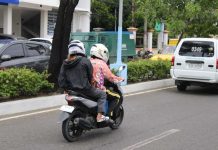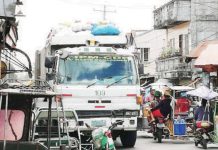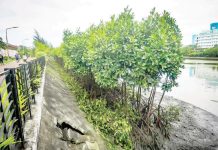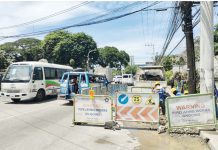
[av_one_full first min_height=” vertical_alignment=” space=” custom_margin=” margin=’0px’ padding=’0px’ border=” border_color=” radius=’0px’ background_color=” src=” background_position=’top left’ background_repeat=’no-repeat’ animation=”]
[av_heading heading=’‘MEDYO WALA NA’ Duterte says illegal drugs in Iloilo waning ‘ tag=’h3′ style=’blockquote modern-quote’ size=’30’ subheading_active=’subheading_below’ subheading_size=’15’ padding=’10’ color=” custom_font=”]
BY PRINCE GOLEZ and GLENDA SOLOGASTOA
[/av_heading]
[av_textblock size=’18’ font_color=” color=”]
MANILA – Illegal drugs in Iloilo seemed to be waning, according to President Rodrigo Duterte who had branded the place “most shabulized” and a “bedrock of drugs.”
During a private dinner at Malago Clubhouse, Malacañang Park late Monday night, Duterte told reporters, “Ang mga mayors d’yan pati barangay captains…‘Di ba sinabi ko sa inyo Iloilo was the hotbed (of illegal drugs)? Ngayon medyo wala na, wala na (Now, it’s kind of waning).”
According to the President, Melvin Odicta Sr. had been killed. He described Odicta as a “big fish” and source of shabu proliferating in areas west of Cebu.
Unidentified gunmen shot to death Odicta at the jetty port of Caticlan, Malay, Aklan on Aug. 29, 2016 three weeks after Duterte called Iloilo “most shabulized” and publicly linked four Iloilo mayors to illegal drugs – Alex Centena of Calinog, Jed Patrick Mabilog of Iloilo City, Sigfriedo Betita of Carles, and Mariano Malones of Maasin.
The Philippine Drug Enforcement Agency (PDEA) had identified Odicta as leader of one of the two drug groups operating in Iloilo. The other was Richard Prevendido of Barangay Bakhaw, Mandurriao district.
Rep. Jerry Treñas of Iloilo City welcomed the President’s statement on Iloilo. He said the “relentless” and collective efforts of the local police, local government units, media, schools and communities have paid off.
“It only means we should continue to work together as a community to reduce and eradicate illegal drugs and addiction in Iloilo City,” Trenas told Panay News yesterday.
Mabilog, for his part, vowed to “sustain” the city’s efforts against narcotics.
“We would like to thank the President for recognizing the efforts being done in Iloilo City in the war against illegal drugs,” said Mabilog.
A “community effort” was how he described the loca antidrug campaign.
“Rest assured that the city government will continue to provide financial and logistical support and will stay committed to keep Iloilo City a drug-free community,” he said.
More than anything, the President’s statement was a challenge for Ilonggos to continue the campaign until the illegal drug problem is obliterated, Mabilog stressed.
“We would like to thank everyone – the PDEA, police, members of the media both print and broadcast, church groups, the public and private sectors,” Mabilog said.
In July, Mabilog urged the Iloilo offices of concerned national government agencies such as PDEA and Philippine National Police to make a report on what the city government had been doing in support of the President’s war on drugs.
“Submit those reports to their higher authorities…sila man gihapon maka-determine kon what we are doing is correct, if we’ve been reaping good results, and if we have eliminated or reduced number of drug personalities in Iloilo. I’m very hopeful nga mapakita man nila where are we right now,” said Mabilog.
The President will stop linking Iloilo to illegal drugs if he is informed correctly of what’s being done, stressed the mayor.
There were only 3,180 validated drug surrenderees in Iloilo City or less than one percent affectation out of the 449,000 total population, said Mabilog, citing data from the police and PDEA.
Mabilog said 1,200 underwent rehabilitation in the city government’s Community Change Centers called Crossroads drop-in facilities in seven districts, and the program of Police Regional Office (PRO-6) in Camp Delgado.
The city government is also supportive of efforts to arrest high-value target drug personalities, said the mayor.
The City Peace and Order Council approved the release of P2 million to boost the intelligence-gathering capability of the Iloilo City Police Office and PDEA. It also approved the release of P2.34 million for the drug rehabilitation program of the PRO-6.
“Wala man nagkulang ang syudad,” said Mabilog.
Meanwhile, over a year after the President named and shamed four Iloilo mayors, his accusation remains unsubstantiated and no charges have been filed against Mabilog, Malones, Betita, and Centena.
The four mayors vehemently denied being illegal drug protectors./PN
[/av_textblock]
[/av_one_full]







